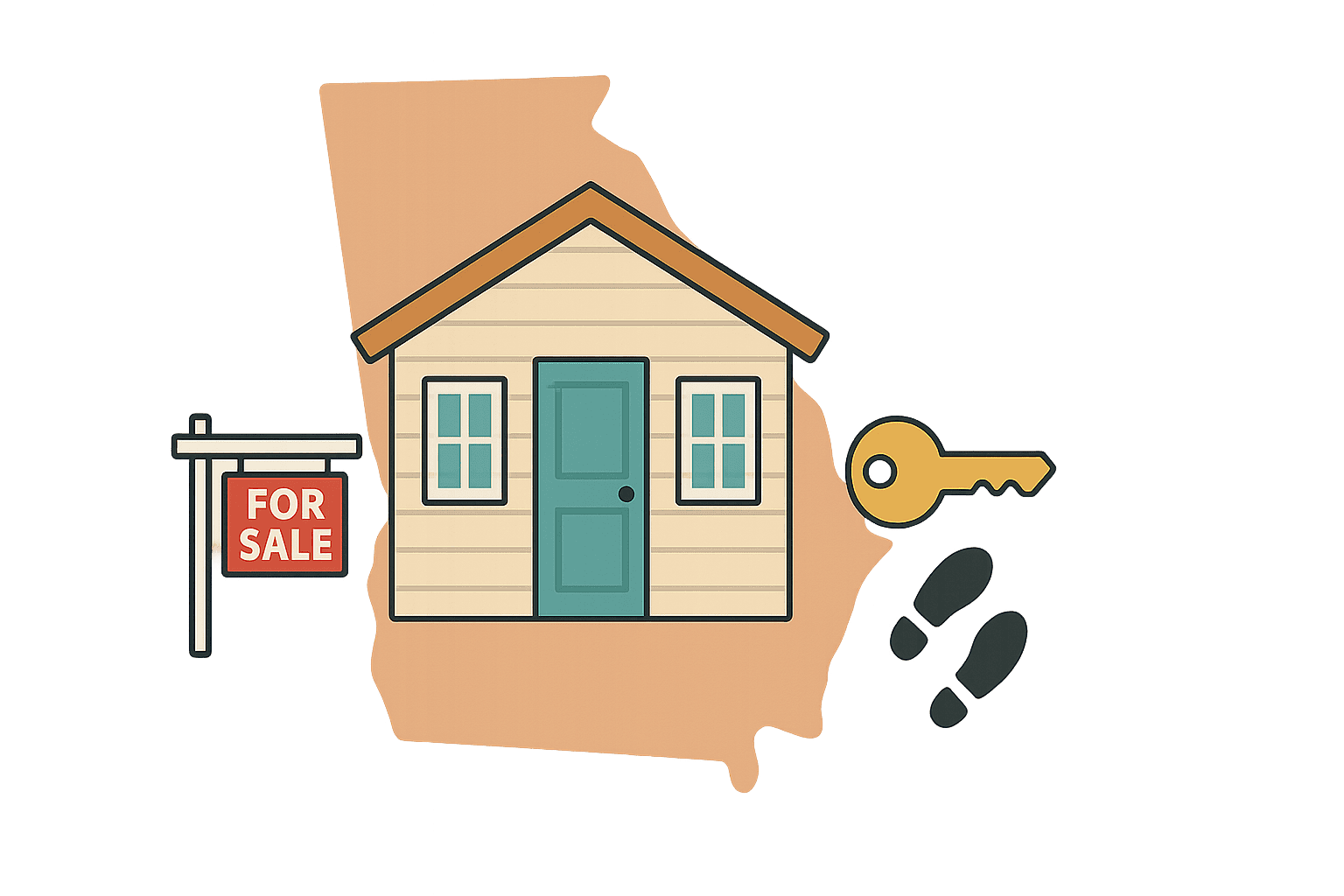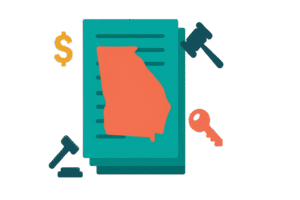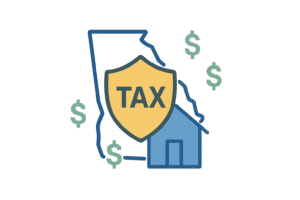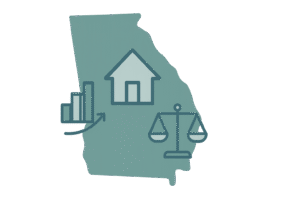Selling Your Georgia Home: A Step-by-Step Guide
Selling your Georgia home can feel overwhelming, especially if you have never done it before. After two decades as a real estate closing attorney in…

Selling your Georgia home can feel overwhelming, especially if you have never done it before. After two decades as a real estate closing attorney in Georgia, I have seen thousands of real estate transactions. Some sail through smoothly, while others hit unexpected bumps that could have been avoided with proper preparation.
With the right approach and careful planning, you can navigate the selling process successfully. This comprehensive guide will walk you through each essential step. We will cover everything, from determining if you are ready to sell to handing over the keys to new owners.
Are You Ready to Sell Your Georgia Home?
Before diving into the selling process, take a step back and assess your situation. Many sellers rush into listing their homes without proper preparation, only to face challenges that could have been anticipated.
Understanding the Georgia Real Estate Market
The Georgia real estate market has unique characteristics that differ from other states. Understanding these differences will help you make informed decisions throughout your home sale.
Is it a Seller’s Market?

Market conditions fluctuate regularly. Knowing whether you are in a seller’s or buyer’s market affects everything from your asking price to your negotiation strategies. In a seller’s market, inventory is low and demand is high, giving home sellers more leverage. Buyers may compete with multiple offers, potentially driving up your sale price.
During a buyer’s market, the opposite occurs. More homes are available, and buyers have more choices. This means you will need to price competitively and ensure your home stands out from the competition.
Local vs. Statewide Trends
Georgia’s real estate market varies significantly by region. What is happening in Atlanta may not reflect conditions in Savannah or Augusta. Your experienced real estate agent should provide a comparative market analysis that focuses specifically on your local market.
I have closed deals where sellers underestimated their local market’s strength and left money on the table. Conversely, sellers who overpriced their homes based on statewide trends rather than local conditions saw their properties sit on the market for an extended time.
Getting Your Finances in Order
Understanding the financial aspects of your home sale prevents surprises at closing. Many first-time sellers underestimate the various costs involved in the selling process.
Estimating Your Home’s Value
Your home’s value depends on multiple factors. These include square footage, condition, location, and recent comparable sales in your neighborhood. A professional appraisal or comparative market analysis provides the most accurate assessment.
You should not rely on online estimates from websites. These automated tools lack the detailed understanding of local market conditions that real estate professionals bring to the table.
Calculating Your Net Proceeds
Closing costs typically range from 6% to 10% of your home’s selling price. It is important to plan for these costs upfront to set realistic expectations about your net proceeds.
These costs include:
| Cost Item | Description | Typical Range/Note |
|---|---|---|
| Real estate commission fees | Split between agents | 5-6% total |
| Title insurance and title company fees | Protects ownership | Varies |
| Attorney fees | Required in Georgia | Varies |
| Transfer taxes | State/county fees | Varies by price |
| Outstanding mortgage payoff | Remaining loan | As per statement |
| Prorated property taxes | Shared with buyer | Based on closing date |
| Homeowner association dues | If applicable | Prorated |
I have prepared countless closing statements where sellers were surprised by these costs.
Capital Gains and Other Tax Considerations
If your home has appreciated significantly since you purchased it, you may owe capital gains taxes on the profit. However, most homeowners qualify for the primary residence exclusion. This allows single filers to exclude up to $250,000 in gains, and married couples filing jointly can exclude up to $500,000.
Consult with a tax professional to understand your specific situation. The timing of your sale and your future housing plans can affect your tax liability.
Step 1: Finding the Right Real Estate Agent
Selecting the right real estate agent is one of the most important decisions in your selling process. The right agent can mean the difference between a smooth transaction and months of frustration.
Why an Experienced Agent is Your Best Asset
An experienced real estate agent brings valuable insights that can save you time, money, and stress. They understand local market conditions, have established relationships with other professionals, and know how to navigate potential issues before they become problems.
Top agents in Georgia understand state-specific requirements and local customs. Georgia law requires attorney involvement in closings, and experienced agents work seamlessly with closing attorneys to ensure a smooth transaction. I have worked with agents who anticipated potential title issues early in the process. This saved their clients from costly delays.
A good agent knows your neighborhood’s unique selling points and can position your home effectively against the competition. They understand which improvements provide the best return on investment and which ones might be unnecessary expenses. Local expertise also means understanding seasonal trends in your area.
How to Find a Great Agent
Finding the right agent requires research and careful evaluation. Do not simply choose the first agent you meet or the one with the flashiest marketing materials.
When interviewing potential agents, ask specific questions:
- How many homes have you sold in my neighborhood in the past 12 months?
- What is your average time on market compared to the local average?
- Can you provide references from recent sellers?
- What marketing strategies do you use to attract serious buyers?
- How will you communicate with me throughout the process?
Pay attention to how they answer these questions. Vague responses or inability to provide specific data should raise red flags. Verify that your agent is properly licensed through the Georgia Real Estate Commission.
Check online reviews, but also ask for references from recent clients. A great real estate agent should be proud to share their track record. The time you spend vetting your agent can save significant headaches later.
Step 2: Pricing Your Home for a Quick Sale
Pricing your home correctly from the start is critical for attracting buyers and achieving a successful sale. Many well-prepared homes sit on the market for months due to poor pricing strategies.
The Art of a Realistic Price
Setting a realistic price requires balancing your financial goals with current market conditions. Overpricing leads to an extended time on the market, while underpricing leaves money on the table.
The Role of a Comparative Market Analysis (CMA)
A comparative market analysis examines recent sales of similar homes in your area. Your agent should consider homes that have sold within the past three to six months. They should focus on properties with a similar square footage, number of bedrooms and bathrooms, lot size, age, condition, and amenities.
The CMA forms the foundation of your pricing strategy. The most accurate ones consider multiple data points rather than relying on just one or two comparable sales.
Avoiding Common Pricing Mistakes
Common pricing mistakes include:
| Mistake | Description |
|---|---|
| Emotional pricing | Basing price on needs, not market |
| Ignoring market conditions | Using outdated values |
| Overimprovement | Expecting full recoup on upgrades |
| Inadequate research | Wrong comparables |
A competitive price generates interest from multiple buyers, which can lead to multiple offers. This competition can drive your final sale price above your initial asking price. Homes that are priced properly often receive multiple offers within days of listing.
What to Expect from a Home Appraisal
If your buyer is obtaining financing, their mortgage lender will require a professional appraisal. This ensures the home’s value supports the loan amount.
The appraisal must support the agreed-upon purchase price for the buyer’s financing to proceed. If the appraisal comes in below the purchase price, you will need to negotiate a solution with the buyer.
Options include:
- Reducing the sale price to match the appraisal
- The buyer making up the difference in cash
- Meeting somewhere in the middle
- Canceling the contract (if the buyer’s financing is contingent on appraisal)
Understanding this process helps you prepare for potential negotiations after an appraisal.
Step 3: Getting Your Home Market-Ready
First impressions matter tremendously in real estate. Buyers often form opinions within seconds of seeing your home, whether online or in person.
The Power of First Impressions: Curb Appeal & Staging
Your home’s exterior creates the first impression for buyers. Poor curb appeal can prevent buyers from even entering your home, while great curb appeal can make up for minor interior flaws.
Simple Fixes That Make a Big Impact

Simple improvements can significantly impact your home’s appeal.
- Landscaping: Trim bushes, plant colorful flowers, and ensure the lawn is well-maintained.
- Exterior cleaning: Power wash siding, decks, and driveways.
- Front door: A fresh coat of paint or new hardware can create an inviting entrance.
- Lighting: Ensure all exterior lights work and consider upgrading fixtures.
- Mailbox and house numbers: Replace if worn or outdated.
These improvements typically cost a few hundred dollars but can influence a buyer’s perception of your entire property.
Interior improvements do not need to break the bank. A fresh coat of paint in neutral colors can make rooms feel larger and cleaner. Focus on high-traffic areas and rooms with bold or outdated colors.
Address obvious repairs before listing. These include leaky faucets, squeaky doors, cracked caulking, burned-out light bulbs, and loose cabinet handles. Buyers often become concerned about hidden problems after noticing multiple small, unrepaired issues.
Decluttering and Depersonalizing Your Space
Remove personal items, family photos, and excess furniture. This helps buyers envision themselves in the space. Pack away about one-third of your belongings to make rooms appear larger and more open.
Consider renting a storage unit for items you do not need daily. This investment often pays for itself by helping your home show better and potentially sell faster.
The Benefits of a Professional Stager
Professional stagers know how to highlight your home’s best features while minimizing its weaknesses. They can rearrange existing furniture or bring in rental pieces to create an appealing environment.
While staging requires an upfront investment, staged homes typically sell faster and for higher prices than non-staged homes. The cost often pays for itself through a quicker sale and reduced carrying costs.
Professional Photography and Marketing Strategies
With most buyers beginning their search online, high-quality photos are essential for attracting interest in your home.
Professional photographers understand how to capture your home’s best angles and use lighting to create appealing images. They have specialized equipment and editing skills that smartphone photos cannot match. Poor photos can prevent buyers from scheduling showings, while excellent photos generate interest from serious buyers.
Your online listing should tell a story about your home and lifestyle. Work with your agent to craft descriptions that highlight unique features and benefits. Virtual tours allow buyers to explore your home online, helping them determine if it meets their needs before an in-person showing. This saves time for both you and unqualified prospects.
Social media extends your home’s marketing reach beyond traditional channels. Your agent should share your listing across multiple platforms and encourage their network to share it. High-quality photos and virtual tours perform well on social media.
Step 4: The Georgia Home Selling Process
Once your home is listed and marketed, you will begin receiving showing requests and, hopefully, offers.
Navigating Showings and Open Houses
Showings are your opportunity to make a great impression on buyers. Proper preparation can make the difference between an offer and a pass.
Here are some tips for a successful showing:
- Create a welcoming atmosphere: Ensure your home is clean, well-lit, and at a comfortable temperature. Open blinds and curtains to maximize natural light.
- Address odors: Eliminate pet, cooking, and smoke odors. Avoid strong air fresheners, which can seem like you are hiding something.
- Minimize disruptions: Remove pets during showings and keep noise levels low. Consider leaving the home during showings to allow buyers to speak freely.
- Highlight key features: Leave lights on in attractive areas and ensure your home’s best features are easily noticed.
Open houses can generate interest from buyers who might not have scheduled a private showing. They are particularly effective in busy neighborhoods where neighbors might know interested friends or colleagues. Work with your agent to determine if open houses make sense for your property and target market.
Evaluating Offers and Negotiations
Receiving an offer is exciting, but it is just the beginning of the negotiation process. Every aspect of the purchase agreement is potentially negotiable.
Consider more than just the purchase price when evaluating offers:
- Financing terms: Cash offers provide more certainty than financed offers.
- Closing timeline: Does it align with your needs?
- Contingencies: Fewer contingencies mean less risk.
- Earnest money: Higher amounts indicate serious intent.
- Inspection period: A shorter period reduces uncertainty.
I have closed transactions where the highest offer was not the best offer due to financing concerns or unrealistic timelines. Cash offers eliminate financing contingencies and often close faster. Strong pre-approval letters from reputable lenders reduce the risk of financed offers.
Contingent offers depend on the buyer selling their current home first. These can work but require longer timelines and backup plans.
Step 5: Home Inspection and Due Diligence
After accepting an offer, the buyer typically has a specified period to complete their due diligence, including a professional home inspection.
What to Expect from a Home Inspection
Home inspections are standard practice in Georgia real estate transactions. A qualified home inspector will examine your home’s major systems and components:
| System | Elements Examined |
|---|---|
| Structural | Foundation, framing, roofing |
| Electrical | Panels, wiring, outlets, fixtures |
| Plumbing | Pipes, fixtures, water pressure, drainage |
| HVAC | Heating, cooling, ventilation, ductwork |
| Exterior | Siding, windows, doors, drainage |
| Interior | Floors, walls, ceilings, doors, windows |
The inspection typically takes 2-4 hours, depending on your home’s size and complexity.
No home inspection comes back perfect. The key is distinguishing between major issues that affect safety or significant value and minor problems that are normal for a home of your age and condition.
Work with your agent to develop a response strategy. You might:
- Address major safety or structural issues.
- Provide credits for repairs instead of completing them yourself.
- Negotiate which party handles specific repairs.
- Stand firm on minor cosmetic issues.
Reasonable responses typically keep transactions moving forward, while unreasonable positions often lead to contract cancellations.
Understanding Your Disclosure Obligations
Georgia follows a “caveat emptor” (buyer beware) approach to real estate transactions, but sellers still have disclosure obligations. While Georgia does not require extensive disclosure forms like some states, sellers must disclose known material defects that affect the property’s value or desirability.
Material defects include:
- Structural problems
- Major system failures
- Environmental hazards
- Flood or water damage history
- Pest infestations
Failing to disclose known material defects can lead to legal liability after closing. When in doubt, disclose the issue and let the buyer make an informed decision.
Step 6: Closing Day: A Smooth Finish
The closing process in Georgia involves specific legal requirements and procedures that differ from other states.
Once inspection and financing contingencies are satisfied, both parties prepare for closing. This involves coordinating multiple parties and completing various requirements.
The Role of the Attorney & Title Company
Georgia requires attorney involvement in real estate closings. The attorney or their staff typically handles:
- Title examination
- Preparing closing documents
- Conducting the closing
- Recording the deed
- Distributing funds
Title companies often work with attorneys to provide title insurance and handle escrow functions. This team approach helps ensure a smooth closing. The buyer’s lender will order a final appraisal and complete underwriting before approving the loan.
Any last-minute issues must be resolved quickly to avoid closing delays. Stay in communication with your agent and attorney about any potential issues that arise during this period.
Final Walk-Through and Key Handover
The final walk-through typically occurs 24-48 hours before closing. This gives the buyer one last chance to verify the property’s condition.
Closing requires numerous documents:
- Deed: Transfers ownership to the buyer.
- Settlement statement: Details all financial transactions.
- Title insurance policy: Protects the buyer’s ownership rights.
- Loan documents: If the buyer is financing the purchase.
- Various affidavits and disclosures.
Your attorney will explain each document before you sign.
At closing, you will sign the deed transferring ownership to the buyer. Once the deed is recorded with the county, the transfer is complete and official. You will receive your proceeds via certified check or wire transfer, depending on the amount and your preferences.
After signing all documents and receiving your proceeds, you will hand over all keys, garage door openers, and any other access devices to the new owners. This moment represents the successful completion of your home sale and the beginning of your next chapter.
Final Takeaways for a Successful Sale
Selling your home successfully requires preparation, patience, and professional guidance. The investment in doing things right from the beginning pays dividends throughout the process.
Common Mistakes to Avoid
Based on my experience, the most common seller mistakes include:
| Mistake | Consequence |
|---|---|
| Overpricing from the start | Extended market time, lower price |
| Inadequate preparation | Higher costs later |
| Poor agent selection | Process problems |
| Unrealistic expectations | Frustration, poor decisions |
| Inadequate disclosure | Legal liability |
What’s Next?
The sellers I have worked with who had the smoothest transactions planned ahead, prepared their homes properly, priced them realistically, and worked with qualified professionals. This careful planning typically resulted in:
- Faster sales
- Higher final sale prices
- Fewer complications during closing
- Less stress throughout the process
With your home sale complete, you can focus on your next chapter. Whether you are buying another home, relocating, or downsizing, the proceeds from your successful sale provide the foundation for your next step.
Take time to celebrate this achievement. Selling a home successfully requires significant effort and coordination. You have navigated a complex process and achieved your goal. The lessons learned from selling your first home will serve you well if you ever sell again.





